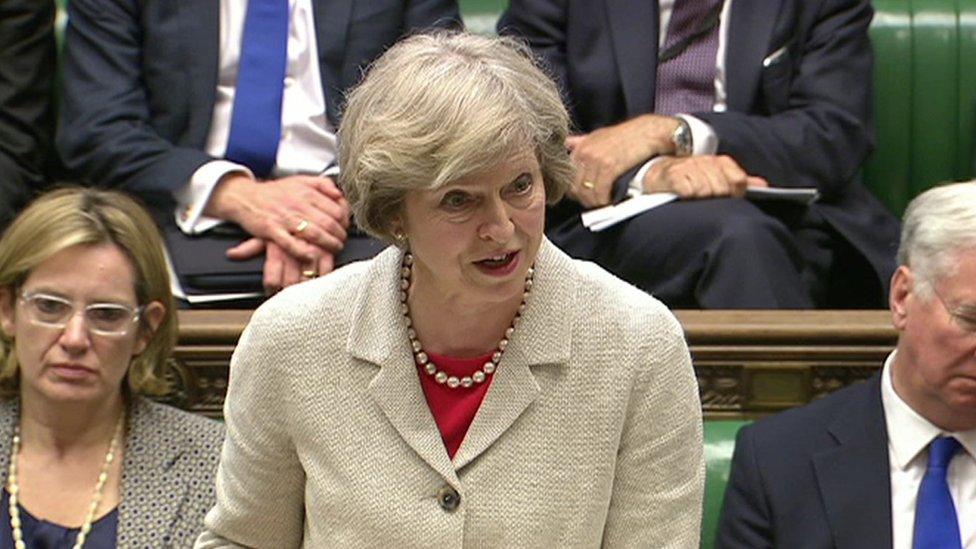MPs vote to renew Trident weapons system
- Published
John Bercow, speaker of the House of Commons announced the result of the vote
The House of Commons has backed the renewal of the UK's Trident nuclear weapons system by 472 votes to 117.
The MPs' vote approves the manufacture of four replacement submarines at a current estimated cost of £31bn.
Defence Secretary Michael Fallon told MPs nuclear threats were growing around the world and Trident "puts doubts in the minds of our adversaries".
Labour was split over the issue with 140 of its 230 MPs going against leader Jeremy Corbyn and backing the motion.
A total of 47 Labour members voted against renewal, while others abstained.
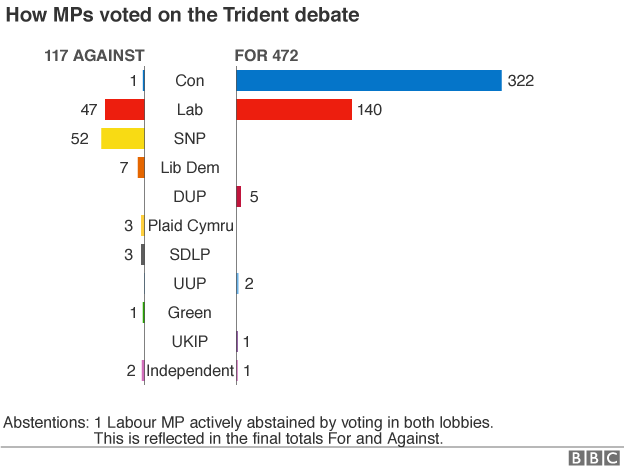
Although Labour MPs were given a free vote, many used the occasion to attack Mr Corbyn, who is a longstanding opponent of nuclear weapons.
A succession of the party's MPs accused Mr Corbyn of opposing official party policy by arguing against it at this stage with one, Jamie Reed, calling his stance "juvenile and narcissistic".

Analysis

By Laura Kuenssberg, political editor
Two striking things.
Theresa May without hesitation said that she would be willing to press the nuclear button - without flinching in the face of that question, there was not a moment's doubt.
Secondly, how much agony there was on the Labour benches. The party's difficulties around Trident crystallising the divisions and doubts inside the party.
Possibly on Tuesday, but possibly not until Wednesday, Labour will know which of its MPs will take on Jeremy Corbyn in a leadership contest over the summer.

One Conservative MP, Crispin Blunt, voted against renewal while 322 supported the motion.
The UK has four submarines that each carry up to eight Trident missiles. The missiles can be fitted with a number of warheads, which can be directed at different targets.
The Trident fleet is based at HMNB Clyde, in Faslane, but all MPs for Scottish constituencies taking part in the vote, except for Scottish Secretary David Mundell, were against renewal.
The SNP opposed the move, saying nuclear weapons were "immoral" and the continued stationing of submarines on the Clyde could accelerate moves towards independence.
After the vote, the SNP said the government "must respect Scotland's clear decision against Trident renewal and remove these nuclear weapons of mass destruction from the Clyde".
Defence minister Harriett Baldwin said: "People put politics aside and marched through the lobbies in support of our nation's security. This was a very important vote as defence is the first job of government".
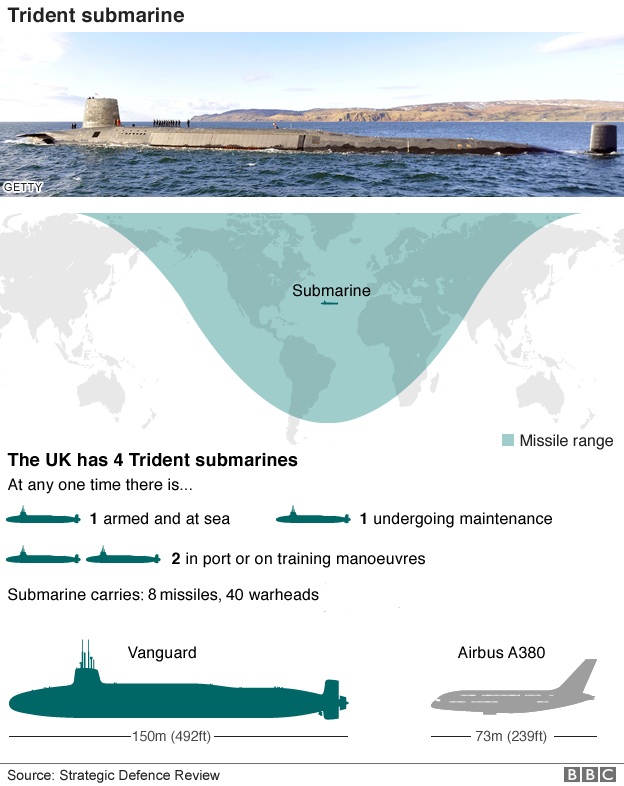
Labour's John Woodcock voted in favour of the submarines which are built in his constituency, Barrow in Cumbria, and said: "This shows that the House of Commons but also the Labour party can take long term decisions in the future of the nation but also protect thousands of jobs across the country."
The vote, by a majority of 355, came at the end of a five-hour debate, in which Theresa May spoke at the despatch box for the first time as prime minister.
She said it would be an "act of gross irresponsibility" for the UK to abandon the continuous-at-sea weapons system.
Although preparatory work on renewal is already under way, Monday's vote gives the final green light to a new fleet of submarines which are due to come into service by the early 2030s.
'Serious investment'
Summing up, Mr Fallon said Trident had helped protect the UK for more than 50 years and to disown it now would be to "gamble the long-term security of our citizens".
The UK faced growing threats from rogue nations, such as North Korea, as well as a more assertive Russia, he said.
"Nuclear weapons are here, they are not going to disappear," he said. "It is the role of government to make sure we can defend ourselves against them."
While acknowledging Trident was a "serious investment", Mr Fallon rejected claims it was a Cold War relic and could be increasingly vulnerable to cyber attacks.
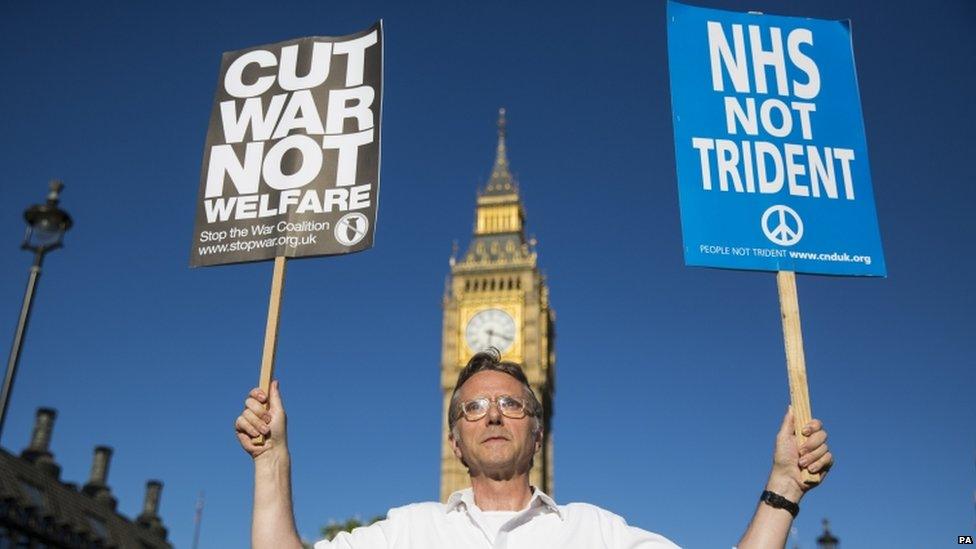
There were protests inside and outside Parliament during the five-hour debate
The UK, he insisted, was committed to multilateral nuclear disarmament and would reduce its stockpile of nuclear warheads to 180 by the mid-2020s.
Meanwhile, Labour's policy is in flux amid continuing divisions at the top of the party. Labour endorsed Trident renewal at the last election and although Mr Corbyn and his allies oppose it, a policy review on the issue has yet to be completed.
- Published19 June 2016
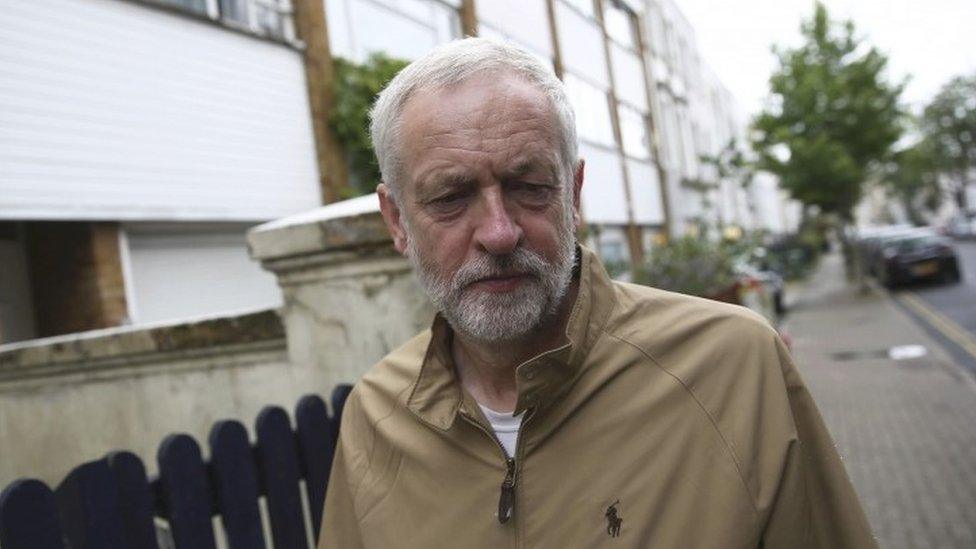
- Published18 July 2016
